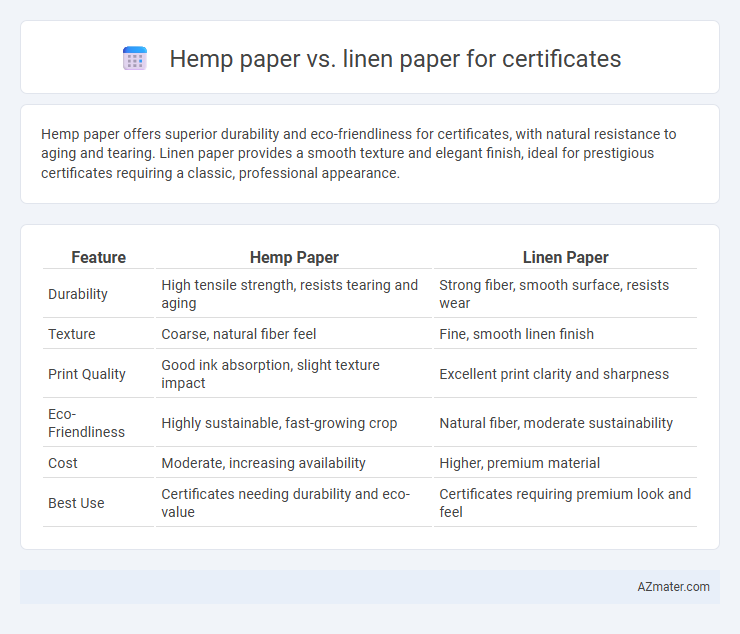Hemp paper offers superior durability and eco-friendliness for certificates, with natural resistance to aging and tearing. Linen paper provides a smooth texture and elegant finish, ideal for prestigious certificates requiring a classic, professional appearance.
Table of Comparison
| Feature | Hemp Paper | Linen Paper |
|---|---|---|
| Durability | High tensile strength, resists tearing and aging | Strong fiber, smooth surface, resists wear |
| Texture | Coarse, natural fiber feel | Fine, smooth linen finish |
| Print Quality | Good ink absorption, slight texture impact | Excellent print clarity and sharpness |
| Eco-Friendliness | Highly sustainable, fast-growing crop | Natural fiber, moderate sustainability |
| Cost | Moderate, increasing availability | Higher, premium material |
| Best Use | Certificates needing durability and eco-value | Certificates requiring premium look and feel |
Introduction to Hemp Paper and Linen Paper
Hemp paper, made from the fibrous stalks of the hemp plant, offers exceptional durability, resistance to yellowing, and eco-friendly attributes ideal for certificates requiring longevity. Linen paper, crafted from flax fibers, is renowned for its smooth texture, premium quality, and classic appearance, often used in high-end official documents and certificates. Both hemp and linen papers provide unique advantages in archival stability and tactile appeal, making them popular choices for important certificates.
Historical Use of Hemp and Linen in Papermaking
Hemp paper has historically been prized for its durability and resistance to deterioration, with records dating back to ancient China around 105 AD, where hemp fibers were predominantly used for papermaking. Linen paper, originating from flax fibers, was widely utilized in Europe during the Middle Ages and Renaissance for creating important documents and certificates due to its fine texture and archival quality. Both hemp and linen papers have been traditional choices for certificates, but hemp's long-standing association with strength and longevity reflects its historic role in durable, high-quality paper production.
Production Process: Hemp Paper vs Linen Paper
Hemp paper is produced by extracting fibers from the stalks of the hemp plant, which are then broken down through a chemical or mechanical pulping process to create long, strong fibers ideal for durability. Linen paper, derived from flax fibers, undergoes a retting process to separate fibers, followed by cleaning and beating to achieve a fine texture suitable for high-quality certificates. Hemp paper production is faster and more sustainable due to rapid hemp growth and higher fiber yield, while linen paper involves longer preparation and more labor-intensive steps, impacting cost and environmental footprint.
Environmental Impact and Sustainability
Hemp paper for certificates significantly reduces environmental impact due to its rapid growth cycle and minimal need for pesticides, making it a more sustainable option compared to linen paper derived from flax, which requires longer cultivation periods and more water resources. Hemp's high cellulose content allows for stronger, more durable paper with less chemical processing, whereas linen paper production involves intensive retting and bleaching processes that increase carbon footprint. Choosing hemp paper supports sustainable forestry and reduces deforestation risks, contributing to eco-friendly certificate printing practices.
Durability and Longevity Comparison
Hemp paper offers superior durability and resistance to wear compared to linen paper, making it ideal for certificates that require long-term preservation. The high cellulose content in hemp fibers contributes to exceptional strength and resistance to yellowing, ensuring certificates remain intact and legible for decades. While linen paper provides a refined texture, hemp paper's longevity and environmental benefits make it the preferred choice for archival-quality certificates.
Texture, Appearance, and Aesthetic Qualities
Hemp paper offers a slightly rough texture with natural fiber variations, creating a rustic and organic appearance that enhances authenticity for certificates. Linen paper features a smooth, finely woven texture with a subtle horizontal and vertical linen pattern, conveying elegance and professionalism. Both papers provide durable, high-quality aesthetics, but hemp emphasizes a natural, eco-friendly appeal while linen prioritizes refined sophistication.
Printing and Ink Compatibility
Hemp paper offers excellent ink absorption and durability, making it ideal for high-quality certificate printing with vibrant, long-lasting colors and reduced smudging. Linen paper's textured surface enhances ink adherence, providing a classic, tactile finish perfect for formal certificates requiring sharp, clear text and images. Both papers are compatible with most ink types, but hemp paper tends to perform better with laser and offset printing, while linen paper excels in digital inkjet applications.
Cost and Accessibility
Hemp paper typically incurs higher production costs due to the extensive processing required for its fibers, making it less affordable than linen paper for certificates. Linen paper benefits from widespread availability and established manufacturing channels, resulting in lower prices and easier procurement. Cost-conscious institutions often prefer linen paper because it balances durability and accessibility without the premium expense associated with hemp.
Cultural and Legal Considerations
Hemp paper, derived from the Cannabis sativa plant, carries distinct cultural implications due to its association with the hemp and cannabis industries, which may influence its acceptance in formal documents like certificates depending on regional attitudes and regulations. Linen paper, traditionally made from flax fibers, is widely recognized for its durability and formality, often preferred for official certificates in jurisdictions valuing historical continuity and legal reliability. Legal considerations also highlight that hemp paper production is subject to varying international regulations tied to cannabis classification, while linen paper remains broadly uncontroversial, ensuring smoother legal validation and acceptance in official documentation.
Choosing the Right Paper for Certificates
Choosing the right paper for certificates hinges on durability and appearance, with hemp paper offering eco-friendly strength and resistance to wear while linen paper provides a classic texture and professional aesthetic. Hemp paper's natural fibers create a robust surface ideal for long-lasting documents, whereas linen paper's fine, woven pattern enhances visual appeal and authenticity. Selecting between hemp and linen paper depends on balancing sustainability preferences with the desired tactile sophistication for official certificates.

Infographic: Hemp paper vs Linen paper for Certificate
 azmater.com
azmater.com